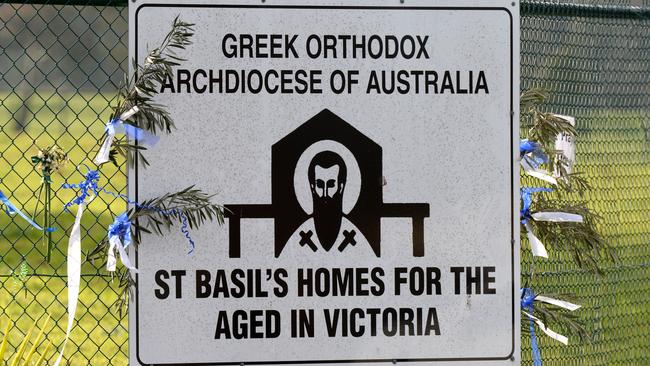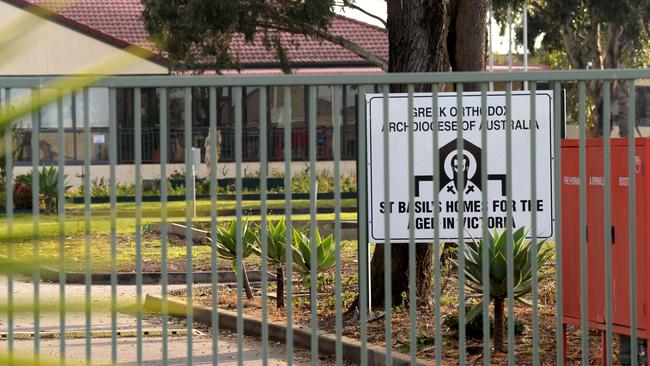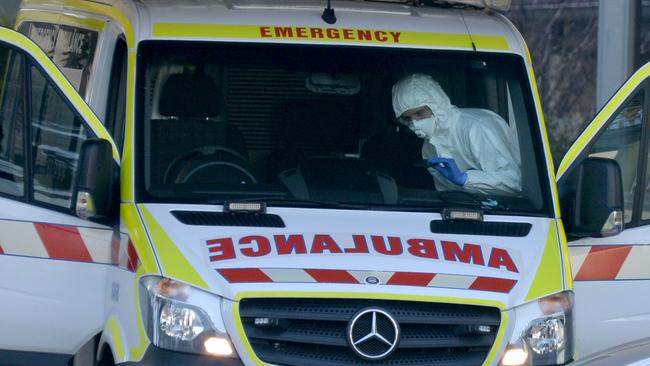Chief health officer Brett Sutton blasted by doctors for ‘shocking’ St Basil’s call
Doctors urged chief health officer Brett Sutton not to stand down staff at St Basil’s aged care but their pleas were ignored, an inquest has heard.
Police & Courts
Don't miss out on the headlines from Police & Courts. Followed categories will be added to My News.
A Commonwealth public servant who put together a “completely inadequate” replacement workforce for doomed St Basil’s warned the Victorian health department never to repeat the “frankly dangerous” decision again.
At an inquest into the deaths of 50 residents, Neil Callagher questioned why Chief health officer Brett Sutton made the dire call to stand down all St Basil’s workers, deemed Covid-19 close contacts, and replace them with agency staff on July 22, 2020.
The decision, described by “very impassioned” doctors as “shocking”, led to the severe malnutrition of residents – 50 of whom died in the coronavirus outbreak in July and August last year.
Just 10 days after the St Basil’s staff takeover, all residents were taken to hospital in an emergency evacuation.

Four days later, DHHS emailed Mr Callagher asking for another full staff replacement at infected Kalyna Care in Delahey.
But the former director of the Commonwealth Aged Care Covid-19 implementation branch, now retired, told DHHS’s Maree Roberts of the disaster at St Basil’s, and said a staff replacement was “an extremely high risk proposition and further endangers the welfare of residents”.
“I would recommend this strategy not be attempted, the preferable option should be to decant all residents (to hospital).”
But Ms Roberts hit back, saying it was “a (Victorian) public health decision based on public health risk”.

Mr Callagher said he “failed to understand” how Prof Sutton did not put more weight on the desperate pleas of doctors against the staff stand down plan.
But Prof Sutton did not attend the meetings where doctors said it was a “shocking idea” and “general care is the problem, not Covid”.
“In the face of that sort of evidence, I don’t know that I could have taken the decision that was made,” Mr Callagher said.
He was so disturbed by the orders from the Victorian government to replace the workforce he said he considered resigning from his job.
But he never told the Victorian public health unit that a surge workforce couldn’t be achieved.
The night before the takeover, on July 21, Mr Callagher was sent a “completely inadequate” replacement staff list from Aspen Medical, which held a multimillion-dollar contract with the Commonwealth.
“To get an email like that at that stage of the process was extremely disturbing,” he said.
Those who did arrive to work at St Basil’s the next day quickly depleted, with some never returning for a second shift and others getting sick with Covid-19.
Meanwhile, residents deteriorated due to dehydration and starvation.
The worker who seeded the deadly St Basil’s outbreak has been repeatedly quizzed about her knowledge of Covid-19 symptoms by lawyers for Victoria’s health department, who defended their “shocking” decision to stand down all staff.
Worker “A” — the Personal Care Attendant who sparked the cluster that killed 50 residents — was questioned at the inquest about her symptoms, her knowledge of documented Covid-19 symptoms and who she had contact with before testing positive on July 9, 2020.
Ms A – whose identity has been suppressed – was given protection by Victorian Coroner Judge John Cain against criminal action when giving evidence at an inquest into the deaths of 50 St Basil’s residents in July and August of 2020.
The Personal Care Attendant told the court: “I object to giving evidence because I am concerned about self incrimination”. But Judge Cain signed a special certificate that any evidence she gave could not be used against her in any criminal proceeding.
Lawyer Mary Anne Harley, QC, for Victoria’s Department of Health, defended her repeated questioning of Ms A, saying it was “central to our case” that there was “such pervasive widespread infection at St Basil’s that there was no alternative” but to stand down all staff as close contacts on July 22.

That decision, signed off by chief health officer Brett Sutton, has been blamed for a massive decline in care for residents, who were later found severely dehydrated and starving after junior agency workers took over.
Ms Hartley said Ms A’s symptoms, timing of her symptoms and contacts were “all ingredients that go to part of that case”.
Counsel assisting, Peter Rozen, QC, pointed out that Ms A was temperature tested before each shift, while she gave evidence on Tuesday that she had been asymptomatic.
Another witness at the coronial inquest pointed blame back to the Victorian health department, saying the “biggest problem” was the department not testing St Basil’s residents quickly enough.
St Basil’s nurse Jagmeet Nagra said there was a “big delay” — a total of eight days despite requirements to test within six hours — before testing occurred after Ms A’s confirmed positive case.
“(Manager) Vicky (Kos) told me that she had reported the case to the department of health, and was waiting for them to come and test everyone at St Basil’s,” Ms Nagra said in evidence.
“She also told me she had contacted doctors at the Northern Hospital, but they had told her we had to wait for testing from the department of health.”
Ms Nagra said: “If the department had come in straight away, the consequences would be better”.
INDEX CASE TOLD SHE COULD WORK
Earlier, Ms A told the court she was told she could come to work, despite reporting her family was unwell, because she did not have symptoms.
She told the court she had been asymptomatic both before testing positive on July 9, 2020 and afterwards.
She said on July 5, after seeing the news, she got tested at a Broadmeadows carpark with four family members – all of whom she said were asymptomatic and whom she lived with.
“Government was saying the Moreland area where I live, that one is very high-risk area, red zone, and the advice is to go and do the test,” Ms A told the court.
“As soon as we heard the news, we went for a test.”
While there, she said she told a testing staffer she worked in aged care and was told: “If it is asymptomatic – you don’t have any symptoms – you can go for work”.
On July 7, she sent her colleague, Ms Nagra, a WhatsApp text, saying two of the family members she lived with had flu-like symptoms.
However, Ms A reported that she was “totally fine” and asked if she should return to work. Ms Nagra said “as per policy” at the time “if you are asymptomatic you can go to work”, which is what she told Ms A.
The following day, on July 8, she returned to St Basil’s before receiving a text from her husband saying her sister-in-law had tested positive.
The next day, Ms A also tested positive. It’s understood Ms A may have been infectious during her shifts at the Fawkner home on July 4, 5 and 8.
Ms Nagra gave evidence to the court that staff who had “no temperature, no cough, no runny nose and no sore throat” were OK to continue working, but could not come to work if they had any of these symptoms.

Three days later, on July 8, Ms A said she returned to St Basil’s after her days off, where she received a text from her husband saying her sister-in-law had tested positive.
“Straight away I pack my bag,” she said, stating she put on a mask and went home to isolate.
The next day, on July 9, Ms A tested positive and said she immediately called her manager at St Basil’s.
It’s understood Ms A may have been infectious during her shifts at the Fawkner home on July 4, 5 and 8.
Ms A denied evidence from two colleagues who said in the days before testing positive, Ms A said her family members had sore throats and she felt “very tired – different to other times”.
“No, I didn’t say that,” she replied.
Despite her positive test, Ms A said she never experienced any symptoms of coronavirus.
“Nothing was happen to me, no symptom,” she said.
Ms A returned to work at St Basil’s about two or three months later.
Her colleague, registered nurse Jagmeet Nagra, confirmed they shared WhatsApp texts on July 7, the night before she returned to work, where Ms A said two of her family members who she lived with had flu-like symptoms.
However, Ms A reported that she was “totally fine” and asked if she should return to work.
Ms Nagra said “as per policy” at the time “if you are asymptomatic you can go to work”, which is what she told Ms A.
The nurse also told the court about handing over to Commonwealth agency staff when she – along with all her St Basil’s colleagues – were ordered to stand down under the directive of Chief health officer Professor Brett Sutton who deemed them close contacts.
Ms Nagra said she was so concerned by the inexperience of the staff taking over on July 22 that she offered to stay back and help.
“We were very worried, and the residents were worried too, really, because all the new faces were coming in,” she said.
During the handover, Ms Nagra said she asked the replacement staff “how long you been working in this industry?”
“I can recall two of them was their first shift in St Basil’s, that’s what they told me.”
Within a day of the takeover, agency staff – many who had been registered that year – were seen crying, with some feeling so overwhelmed that they left their shift and never came back.
Conditions at the home were described by a visiting nurse on July 23 as “horrific” with residents going unfed, sitting in soiled nappies and with medications strewn about.
“You can’t hand over a facility, 150 people, in one day or that many hours,” Ms Nagra told the court.
PICTURES REVEAL ‘HORRIFIC’ CONDITIONS
Deep cleaners at St Basil’s left the highly infectious home after six residents died of Covid-19 and went to the local shops dressed in PPE to grab lunch.
New documents before an inquest into the deaths of 50 St Basil’s residents reveal that “young, inexperienced” cleaning staff were reprimanded after returning to the Fawkner home from up the street where they had gone to get a bite to eat on July 25, 2020.
At that time, six residents had died from Covid-19, 48 residents had the virus and a further 20 health care workers were infected.
It came as contaminated rubbish piled up outside the “highly infectious site” as an overwhelmed waste company refused to collect the bags.
“Media have been present and are taking pictures,” Assistant Deputy Secretary Covid 19 division Annaliese Bamford said in an email on July 25, where she called for an urgent clean-up.

Contracted Victorian Health Department nurse Kirsten Congerton had visited St Basil’s that day and stopped a crew of deep cleaners, dressed in PPE suits, in the driveway as they returned from “picking up lunch at the local shops”.
“Spoke to cleaning manager about inappropriateness of this behaviour, that is (sic) was an infection risk and also a risk to works (sic) being abused walking down the road,” her report said.
Two days earlier, Ms Congerton went to St Basil’s for the first time and described the “horrific” conditions, with a resident dead and others dying during her visit, on July 23.
That was one day after Commonwealth agency workers took over the Fawkner home due to chief health officer Prof Brett Sutton standing down all St Basil’s staff for being close contacts.
New documents tendered to the inquest describe how starving residents resorted to violence and begged to be allowed to leave the locked-down home after Commonwealth agency staff took over.

Ms Congerton described witnessing a resident “trying to smash glass front doors, threatening to kill everyone is (sic) he was not let out”, on July 25.
“You’re dead, if I go back to my room I will kill all the other residents,” said the man, who was a low care resident who otherwise would have been able to leave the home.
Police were called before the man told the nurse he was “starving” and said he “would now begin (to) strike”, calling to be let out so he could get food from the shop.
He was later taken to hospital by paramedics.
On the same day, another resident said he hadn’t eaten in four days and “finally got a drink and some banana for breakfast that morning”.
A welfare check on residents in the hostel found “many show signs of dehydration … broken swollen lips from cracking (dehydration), food still wrapped”.
Another resident two days earlier threatened a staff member he would “smash (her) face in”, with his behaviour attributed to a “complaint of receiving no food and as a result was hungry”.
The inquest continues.




